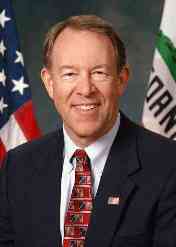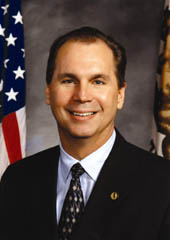Bill Leonard and Ray Haynes are both influential and important Republican officials in California. Leonard, currently on the State Board of Equalization, spend decades in the State Legislature, serving in both the Senate and Assembly. Haynes has also served in both houses of the legislature, and is now the senior (or tied for it anyways – I’m not sure). in the legislature.
Leonard and Haynes both have e-newsletters they send out. Below I am excerpting Leonards thoughts on both the Governor’s BIG BOND proposal, as well as on the issue of mandating a increase in the minimum wage.
Immediately beneath Leonard’s thoughts, I have excerpted some of Ray Haynes’ observations.
FROM LEONARD: ***The Price of Bonds***
***The Price of Bonds***
The Governor’s proposal to issue bonds to pay for infrastructure improvements continues to concern me. I was pleased to hear him say that he believes we should cap the state’s debt ratio at six percent.
According to the Legislative Analyst’s Office, the current debt service ratio is about 4.5% and is projected at 5.9% if the infrastructure bonds are included. If we accept that we are willing to spend 6% of our annual budget on infrastructure, then the next question is: should we spend it servicing debt or actually buying stuff? It is the same set of options faced by a homeowner needing kitchen renovation. The homeowner must
decide: should I set aside 6% of my income for a certain amount of time and do the improvements when I have saved enough, or should I borrow the money and spend 6% of my income paying off the loan? I do not believe the legislature has explored these two options and that we are rushing headlong into borrowing for projects that, while needed, could be better handled by investing savings rather than paying interest.
*** Minimum Wage Hikes Hurt the Poor ***
In the wake of Governor Schwarzenegger’s announcement that he will seek a minimum wage rate hike policymakers should consider the Golden Gate Restaurant Association’s findings: 98% of restaurants raised their prices, 89% significantly, 54% reduced the number of employees, and 91% reported lower profits after San Francisco city raised the minimum wage. That seems to accurately reflect the findings by a professor in another city.
A study of the minimum wage hike in Santa Fe, New Mexico, found that it led to an increase in unemployment of 3.3%. The shocking statistic though was this: the likelihood of unemployment increased 8.3% for less-educated employees. Dr. Yelowitz concluded that the minimum wage hike "consequences were particularly harmful to less skilled adult workers – precisely the group for whom the ordinance is intended to help."
My friend Stephen Frank has also drawn together a lot of information showing the ill effects of raising the minimum wage. Frank writes, "The lessons learned from the 40’s, 50’s, ’60’s, through the ’90’s was still true in 2005. If you want to harm those most in need, raise the minimum wage." To sum up a few of the documented effects of raising the minimum wage:
1. Unemployment rises among the poor, even when the economy is good for others.
2. Those on welfare are 44% less able to get off welfare 3. Businesses employ more technology to replace workers.
Frank makes a great case that the minimum wage is a regressive tax and policy against the poor, minorities, and generally those trying to get a firm footing on the economic ladder. He cites numerous cases when even those on the left have admitted the destructive nature of having, let alone raising, the minimum wage. He also found that only about 6% of those making minimum wage are the sole supporter of their families. Read the whole thing at Frank’s blogsite.
FROM RAY HAYNES: MIRROR MIRROR
 I am not a trekkie, but I do remember a Star Trek episode in which several members of the crew of the starship Enterprise entered an alternative universe. That universe was the mirror image of the “normal” universe, that is, it was exactly like the normal universe, but everyone in it had the exact opposite character of the people in the normal universe
I am not a trekkie, but I do remember a Star Trek episode in which several members of the crew of the starship Enterprise entered an alternative universe. That universe was the mirror image of the “normal” universe, that is, it was exactly like the normal universe, but everyone in it had the exact opposite character of the people in the normal universe
We have entered that alternative universe in California.
I know that term limits and the recall have substantially diminished the experience in Sacramento, but anyone paying even the smallest attention to history can tell that Gray Davis lost his job because he (1) greatly expanded the government sector of California’s economy, (2) greatly expanded government debt, and (3) greatly expanded government authority over the private sector in the years 1999-2001. Those two years led to the energy crisis of early 2001, the collapse of the private economy (after a five year record growth) in 2001 and 2002, and the fiscal crises that led to the recall of Governor Davis. Governor Schwarzenegger got elected campaigning against these expansions, and promising to “clean house” in Sacramento. In the alternative universe, as seen on the “Mirror/Mirror” episode in Star Trek, Schwarzenegger would be expanding government, expanding government debt and intruding on the private sector. And, indeed, he is.
In the alternative universe, as seen on the “Mirror/Mirror” episode in Star Trek, Schwarzenegger would be expanding government, expanding government debt and intruding on the private sector. And, indeed, he is.
Let’s look back in California history. In the late 1980’s, Governor Deukmejian, in order to get prison and freeway funding, gave away some very serious concessions to the leftists, vastly expanding state spending and increasing worker’s compensation benefits. In 1991, to accomplish his agenda, Pete Wilson was forced to increased taxes. The ensuing collapse in California’s economy was precipitous. From the Great Depression to 1992, California’s general fund revenue went up every single year. In the 1992-93 fiscal year, for the first time in modern history, California’s general fund revenue dropped in real terms, from $42.1 billion to $40.9 billion.
The state then repealed the upper income tax rate, cut other taxes, reformed worker’s compensation, reduced regulations, and the economy and state general fund revenue exploded, from $40.1 billion in 1993-4 to $79 billion in 2000-01. In 2000 and 2001, the state increased fees and regulations, increased workers’ compensation benefits, substantially increased the size of government, increased the minimum wage, increased environmental and workplace regulation, and did everything it could to interfere with the private economy. As a result, in the 2001-02 budget year, once again, general fund revenue dropped substantially, from $79 billion to $66 billion, leading to the largest budget crisis in the history of the state. Two years later, Gray Davis lost his job.
Now Governor Schwarzenegger, in light of his recent loss at the polls, and his sagging popularity, thinks that he needs to do something different in his job, so he has chosen to increase government debt and government regulation on business. He has already demonstrated a penchant for increasing environmental regulations. An increase in work place regulations, like the minimum wage, and an increase in government debt, is the next step down the road to economic collapse—again.
Governor Schwarzenegger looks back to Pat Brown as the builder of the California dream. Except Pat Brown did his building with little borrowed money, and Ronald Reagan defeated Brown because Brown was a big spender. I am concerned that now that we have entered into this alternative universe, some Democrat is going to assume the Ronald Reagan role, move to the right of Schwarzenegger on spending issues, and carry a broom to sweep him out of office.
In Star Trek, Kirk returned to the Enterprise when Spock was able to reverse the glitch in the transporter that sent Kirk and some of his crew to the alternative universe. Our problem isn’t caused by a transporter glitch. How are we going to get out of this universe?

